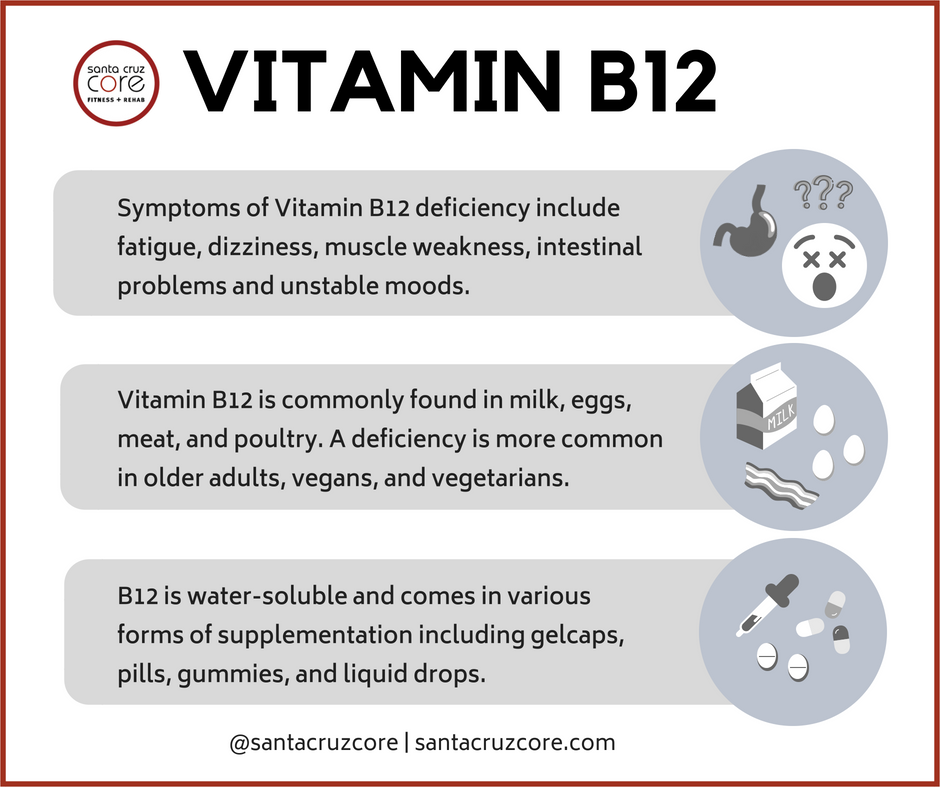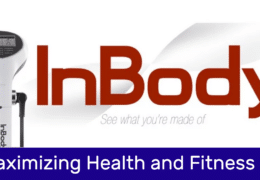Vitamin B12 (or cobalamin) is an important nutrient involved in nerve, cell, and metabolic functions.
 Vitamin B12 is used with a variety of other nutrients, like vitamin B9 (folate), and iron for the production of red blood cells. This is because both vitamins B12 and B9 connect to DNA synthesis which has a subsequent effect in red blood cell production.
Vitamin B12 is used with a variety of other nutrients, like vitamin B9 (folate), and iron for the production of red blood cells. This is because both vitamins B12 and B9 connect to DNA synthesis which has a subsequent effect in red blood cell production.
In the nervous system, B12 helps “coat” neurons with a myelin sheath. Proteins and fats make up myelin sheaths. These provide insulation for neurons to send electrical signals across the axon (the tube-like part of neurons) at a faster rate and without a loss of electrical charge.
In circulation, B12 helps regulate high levels of homocysteine which link to the development of cardiovascular disorders. Unfortunately, there is still lack of evidence suggesting the role of vitamin B12 supplementation as a preventative measure to cardiovascular disease (CVD). When a B12 deficiency is present, however, B12 supplementation brings down the heightened risk for CVD.
B12 Production:
Unfortunately, vitamin B12 cannot synthesize in the bodies of animals or plants. Specific microorganisms, including bacteria and archaea, must create this vitamin. B12 makes its way into the food chain when animals we eat consume these microorganisms, or make a part of that animal’s internal microbial environment (or flora).
An example of one such animal is a cow, which has the necessary microbial population to produce vitamin B12 in its first stomach chamber. B12 resides in an animal’s tissues, including the muscle and liver. Humans then consume B12 through meat and other animal products.
B12 Deficiency:
Since vitamin B12 helps in DNA synthesis and red blood cell formation, its deficiency sometimes results in anemia and other related symptoms. Symptoms include fatigue, dizziness, muscle weakness, intestinal problems and unstable moods (1).
Vitamin B12 deficiencies severely affect cognitive function. They give rise to a variety of symptoms associated with nerve function and mood instability. Symptoms pertaining to nervous function include headaches, dizziness, nausea, and anxiety. In severe cases of B12 deficiency, Alzheimer’s or dementia (both neurodegenerative conditions) are often a diagnosis as they have similar symptoms (2).
A deficiency in B12 also links to gastrointestinal problems. Low B12 levels may contribute to IBS which may include diarrhea, constipation, abdominal pain, and excessive gas production. Additionally, this may contribute to stomach lining and small intestine damage which may further the likelihood of or exacerbate a B12 deficiency.
Who does this Affect?
Vitamin B12 is common in a variety of animal products including meats, eggs, milk, and poultry. This leaves individuals that don’t consume animal products, like vegetarians and vegans, at a higher risk for deficiency. One can avoid deficiency by taking vitamin B12 supplement and consuming foods fortified with it.
Deficiencies in this vitamin are also more likely in older adults and in individuals with gastrointestinal problems. The absorption of B12 in the body can be affected by stomach acid levels and the presence of intrinsic factor which are secreted by parietal cells in the stomach (2). Medications that affect stomach acids levels (such as antacids) may also interfere with vitamin B12 digestion and its subsequent absorption.
Supplementation of B12:
Vitamin B12 is water-soluble and comes in various forms of supplementation including gelcaps, pills, gummies, and liquid drops. B12 supplementation is typically safe as any extra B12 levels pass through the urine. Additionally, the body can store vitamin B12 in the liver for future use.
According to the Mayo Clinic, the stores of vitamin B12 can last for years which makes this deficiency uncommon. A supplement in most cases is enough to treat for a deficiency and related symptoms. Still, a medical professional should always be consulted when undertaking new supplementation.
Have questions about vitamins and supplementation? Then visit Santa Cruz CORE to get recommendations on what you should be taking! Our skilled nutritionists and dietitian can help you find out what your body needs!
References:
“Vitamin B12 Deficiency: Causes and Symptoms.” NutritionSource.org, Harvard T.H. CHAN- School of Public Health, 23 Jan. 2013, www.hsph.harvard.edu/nutritionsource/b-12-deficiency/.
“Vitamin B-12.” Mayo Clinic, Mayo Foundation for Medical Education and Research, 17 Oct. 2017, www.mayoclinic.org/drugs-supplements-vitamin-b12/art-20363663.









